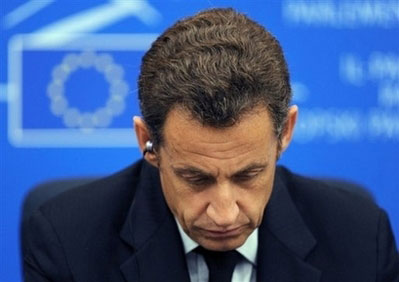
Three days to the start of a joint parliamentary session expected to vote on constitutional reforms, French President Nicolas Sarkozy has finally made moves to woo?the opposition and save one of his major reform goals.
Backed by members of his ruling Union for a Popular Movement (UMP), the head of state is faced with the real prospects of a defeat and the vote is promising to be extremely tight, according to observers.
In an interview published by Le Monde daily Thursday, Sarkozy raised the possibility of limiting the time allocated to the head of state to address lawmakers, which is one of the major conditions laid down by the Socialist Party (PS) before supporting the proposed reforms.
"I pledge that guarantees will be put in place to enable the opposition to respond whenever the president of the republic will speak of any issue connected to French politics," said Sarkozy.
However, French government spokesman Luc Chatel later explained that the guarantee was limited to anytime the president expressed himself as a "politician" without further clarification.
In the interview, President Sarkozy also expressed a desire to let the opposition create "a number of commissions of inquiry" each year. He promised that it will participate in the independent commission that will be created to redraw legislative districts.
On the reform of the senate electoral college, which is another issue where there is a marked disagreement with the socialist-led opposition, Sarkozy merely described as "reasonable" a proposal to modify a 1999 law passed to notably increase the representation of major cities in delegates electing senators.
"I hope that sincere socialists will see that there would be some kind of ridicule in seeking to pass a reform that they have been pushing for steadfastly without ever having the prospects of being implemented," said the head of state.
But the socialists have remained steadfast in their quest to defeat the proposed reforms in the face of what Jean-Marc Ayrault, leader of the PS lawmaker in the lower house of parliament, described as a "political maneuver."
These announcements by Nicolas Sarkozy have had "no effect" on the position of PS members, who have "unanimously agreed to vote against" the proposed institutional reforms during the July 21 congress, Ayrault was quoted as telling reporters Wednesday.
"Most commitments are not covered by the constitution and what has taken him so long? His proposals are largely inadequate and they come across as political maneuver," he said.
On his part, Jean-Francois Cope, head of the majority in the national assembly, said: "There is a time when we should stop lying!" "Each week, the socialists have been making new demands, and each time, it has not been satisfactory."
Cope, who was addressing a press briefing Thursday, notably said that the head of state's proposal on limiting time for his address to the national assembly was "a step forward and timely."
President Sarkozy is also out to court the left-leaning Radical Party and is proposing a reduction on the number of lawmakers needed to form a parliamentary group in the national assembly from the current 20 to 15.
The party, which has 8 lawmakers and 3 affiliated ones, has announced its intention to vote in favor of institutional reforms, but some of its members may decline to support this position, according to political commentators.
But, the key to the adoption of the proposed reforms is not only with the left as a dozen UMP lawmakers are also reluctant to express their support. On Tuesday, Sarkozy had met ruling party lawmakers at the Elysee palace for a buffet of mobilization.
On Wednesday, the senate voted, on the second reading, on the reform bill, which has already been passed by the national assembly and attention is now turning to the next round of battle on July 21. "This Congress will be won by a margin of four votes," according to Cope.
(Xinhua News Agency July 19, 2008)